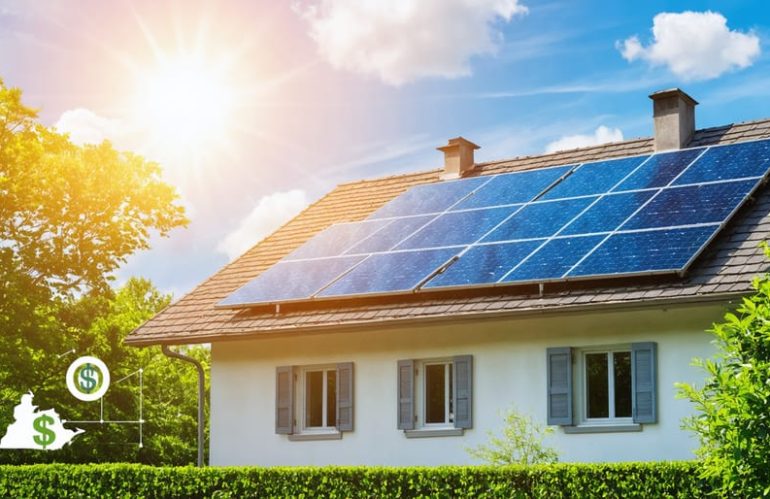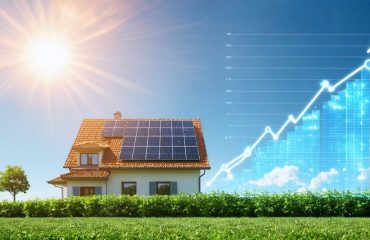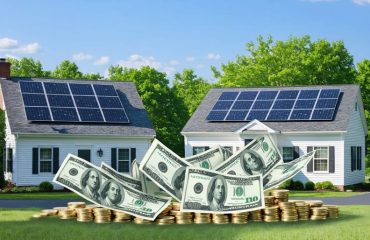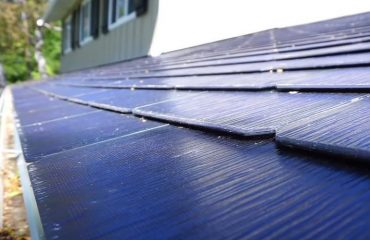Virginia homeowners can now slash their solar installation costs by up to 60% through a powerful combination of state and federal incentives. The federal solar tax credit offers a 30% reduction in total system costs, while Virginia’s net metering program enables residents to earn credits for excess power generation. Combined with local utility rebates and property tax exemptions, the average Virginia household saves $15,000-$20,000 on their solar investment.
Smart timing makes these savings even more impactful in 2024. Virginia’s Solar Freedom legislation has eliminated restrictive HOA solar regulations, while rising electricity rates make solar an increasingly attractive investment. Most Virginia homeowners now break even on their solar investment within 8-10 years, enjoying decades of free clean energy afterward.
These incentives won’t last forever – the federal tax credit begins stepping down in 2032, and some utility rebate programs have limited funding. For Virginia residents considering solar, today’s incentive landscape offers unprecedented financial benefits that make the switch to clean energy more affordable than ever before.
Federal Solar Tax Credit: Your Biggest Money-Saver
How the 30% Tax Credit Works
The federal solar tax credit allows you to deduct 30% of your total solar installation costs from your federal taxes. Claiming this credit is straightforward when you follow these steps:
First, keep detailed records of all expenses related to your solar system installation, including equipment and labor costs. When tax season arrives, complete IRS Form 5695 (Residential Energy Credits) to calculate your credit amount. Then, enter this figure on your Form 1040 federal tax return.
The credit applies to the total cost of your system, including panels, inverters, mounting equipment, and installation labor. If your tax liability is less than the credit amount in the first year, you can carry over the remaining credit to subsequent tax years through 2034.
For example, if your solar system costs $20,000, you’re eligible for a $6,000 tax credit. Remember that this is a tax credit, not a deduction, meaning it reduces your tax bill dollar-for-dollar rather than just lowering your taxable income.
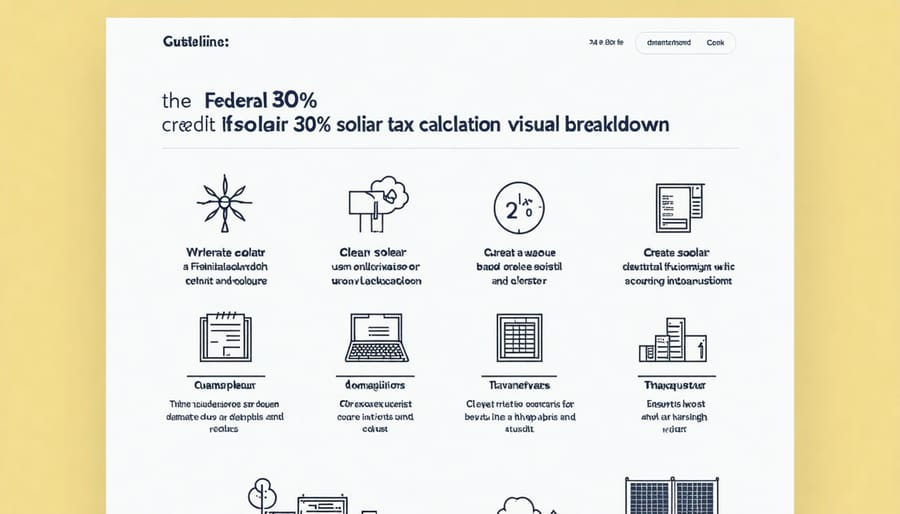
Qualifying Requirements for VA Homeowners
To qualify for VA solar incentives, homeowners must meet several basic requirements. First, you must own your home and have a suitable roof or property space for solar panel installation. The roof should be in good condition and ideally have southern exposure for maximum solar efficiency.
You’ll need to provide proof of homeownership through property deed documentation and ensure your home meets local building codes and zoning requirements. A recent utility bill showing your current energy consumption is also required for most incentive programs.
Before applying, have a professional solar assessment completed to verify your home’s solar potential. This evaluation will determine if your property receives adequate sunlight and confirm your roof can support the weight of solar panels.
Most incentive programs also require you to work with certified solar installers who meet state licensing requirements. Keep detailed records of all quotes, contracts, and installation documentation, as these will be necessary for both incentive applications and tax purposes.
Remember that specific requirements may vary depending on your locality and the particular incentive program you’re pursuing.
Virginia-Specific Solar Incentives
Property Tax Exemption Benefits
Virginia homeowners who invest in solar energy systems can benefit from significant property tax exemptions, making solar installations even more financially attractive. Under Virginia Code § 58.1-3661, localities are authorized to exempt solar energy equipment from local property taxes, and many jurisdictions across the state have embraced this option.
When you install a solar system on your property, it typically increases your home’s value. However, thanks to these exemptions, you won’t face higher property taxes despite this value increase. The exemption applies to both residential and commercial properties, covering 100% of the value added by the solar installation.
For example, if your solar system adds $20,000 to your home’s value, you won’t pay any additional property taxes on that amount. This exemption remains in effect for the entire lifetime of your solar installation, providing long-term savings on top of your reduced energy bills.
To qualify for this exemption, your solar system must be used primarily for collecting, storing, and distributing solar energy. The process to claim this benefit varies by locality, but generally requires filing an application with your local tax assessor’s office. Many Virginia municipalities, including Richmond, Alexandria, and Norfolk, have already implemented these exemptions, making it easier for homeowners to embrace solar energy while protecting their financial interests.
Always check with your local tax assessor’s office to confirm the specific requirements and application process in your area.
Net Metering in Virginia
Net metering is one of Virginia’s most valuable solar incentives, allowing homeowners to maximize their solar investment. Under this program, your utility company must credit you for excess electricity your solar panels generate and send back to the grid.
When your panels produce more power than you’re using, your electric meter actually runs backward, and you bank these credits for future use. During nights or cloudy days when your system produces less power, you can use these accumulated credits to offset your electricity costs.
Virginia law requires utilities to offer net metering to residential customers with systems up to 25 kilowatts in size. The credits you earn are valued at the retail rate – the same rate you pay for electricity from the grid. This one-to-one credit system makes solar much more financially attractive for homeowners.
At the end of each 12-month billing period, any unused credits are carried over to the next year, helping you maximize your solar investment. However, it’s important to note that your system should be sized appropriately to match your annual electricity consumption for optimal benefits.
For most Virginia homeowners, net metering can reduce monthly electricity bills by 70-90%, depending on their solar system size and energy usage patterns. This significant saving, combined with other available incentives, makes solar an increasingly attractive investment for Virginia residents.
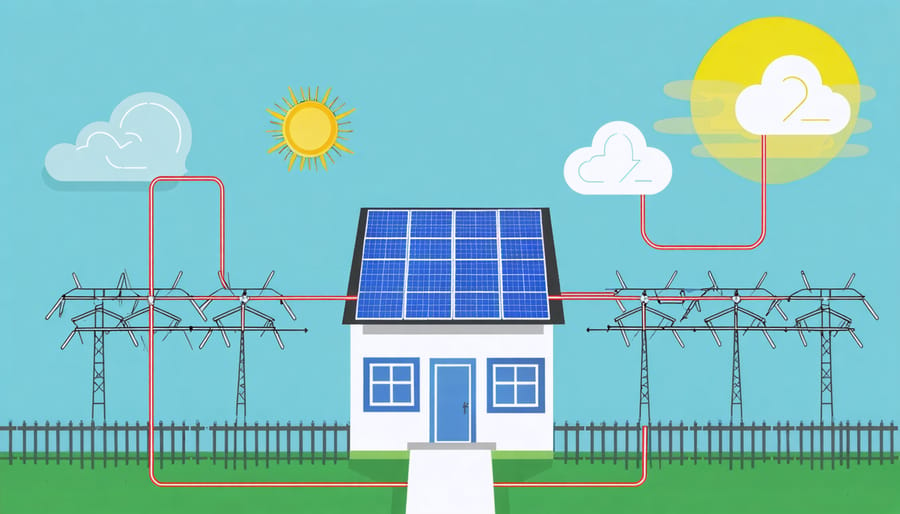
Local Utility Rebates and Programs
Dominion Energy Solar Programs
Dominion Energy offers several attractive solar programs for Virginia homeowners looking to embrace renewable energy. Their Solar Purchase Program (SPP) allows customers to sell the electricity generated by their solar panels back to the grid at a premium rate. This program offers a 15-year contract, providing long-term stability and predictable returns on your solar investment.
The utility also provides net metering, enabling customers to offset their electricity bills with excess solar power. When your panels generate more electricity than you use, the surplus is credited to your account, potentially reducing future bills to near zero during high-production months.
For income-qualified customers, Dominion Energy’s EnergyShare Solar program offers additional assistance, including free solar installations for eligible households. The program aims to make solar energy accessible to more Virginia residents while promoting energy equity.
Customers can also participate in Dominion’s Smart Grid improvements, which optimize solar integration and improve overall system efficiency. To get started, schedule a consultation with Dominion Energy to determine which programs best suit your needs and circumstances.
Other Utility Company Offerings
Beyond Dominion Energy, several other utility companies in Virginia offer valuable solar incentives to their customers. Appalachian Power provides a net metering program that credits solar users for excess energy production at retail rates. They also offer special time-of-use rates for solar customers, helping maximize savings during peak production hours.
The Old Dominion Power Company supports solar adoption through their Solar Partnership Program, which includes installation rebates and performance-based incentives. Meanwhile, the Northern Virginia Electric Cooperative (NOVEC) provides members with solar consultation services and flexible payment options for installation costs.
Many municipal utilities across Virginia have developed their own solar programs. For example, the Harrisonburg Electric Commission offers energy efficiency rebates that can be combined with solar installations, while the Danville Utilities provides special rate structures for solar customers.
Remember to check with your local utility provider, as offerings can vary by region and may change throughout the year. Most utilities also provide free energy audits to help you determine the best solar solution for your home.
Calculating Your Solar Investment Return
Sample Savings Breakdown
Let’s break down a typical solar installation scenario for a Virginia homeowner with a 6kW system. The average initial cost would be approximately $18,000 before incentives. Here’s how the savings stack up:
Federal Tax Credit (30%): -$5,400
Net Metering Savings (Year 1): -$1,200
Property Tax Exemption: -$500
Annual Electric Bill Savings: -$1,100
Total First-Year Savings: $8,200
To calculate your solar ROI, consider that the average Virginia home’s system typically generates around 7,200 kWh annually. With electricity rates averaging $0.13 per kWh and accounting for the 2.5% annual increase in utility rates, most homeowners see a solar panel payback period of 7-9 years.
After incentives, the net system cost of $9,800 divided by annual savings of approximately $1,100 results in an 8.9-year payback timeline. Keep in mind that solar panels typically last 25-30 years, meaning you’ll enjoy about 20 years of pure savings after reaching the break-even point. Over the system’s lifetime, total savings often exceed $30,000 for Virginia homeowners.
Long-term Financial Benefits
Installing solar panels in Virginia offers substantial long-term financial benefits that extend well beyond the initial investment. Over a 25-year period, the typical Virginia homeowner can expect to save between $20,000 and $30,000 on electricity costs, depending on their energy consumption and local utility rates. These savings are calculated after accounting for all installation costs and available incentives.
Solar installations also increase your home’s value by an average of 4.1% in Virginia’s real estate market. For a $400,000 home, this translates to approximately $16,400 in added property value. This increase is particularly significant in urban areas like Northern Virginia, Richmond, and Virginia Beach, where energy-efficient homes command premium prices.
The long-term financial outlook becomes even more attractive when considering rising electricity costs. Historical data shows that utility rates in Virginia increase by approximately 2-3% annually. Solar panel systems protect homeowners from these escalating costs by providing predictable energy expenses for decades. Additionally, modern solar panels are designed to maintain 85% or more of their original efficiency even after 25 years, ensuring consistent energy production and savings throughout their lifetime.
When combined with available tax incentives, rebates, and net metering benefits, the return on investment typically occurs within 8-10 years, leaving homeowners with 15-plus years of pure savings.
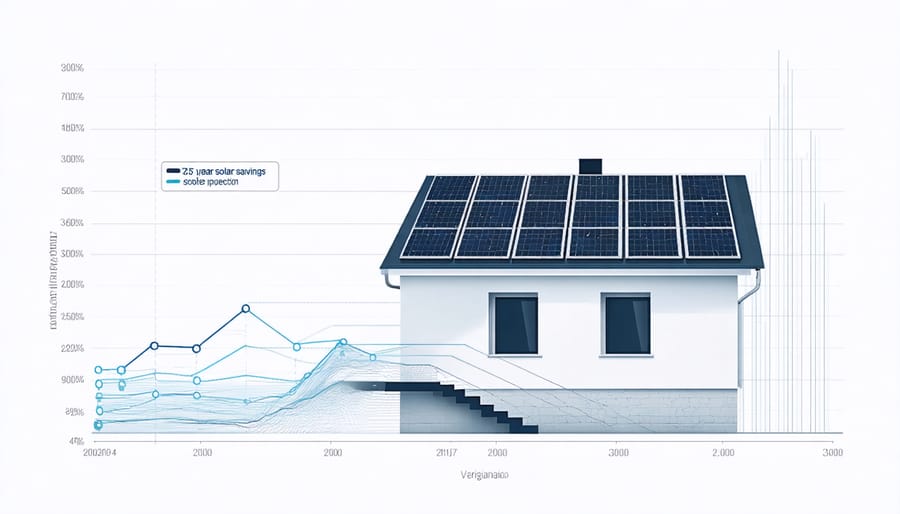
Virginia homeowners have a unique opportunity to capitalize on numerous solar incentives that make the switch to renewable energy both environmentally and financially rewarding. By combining federal tax credits, state-level benefits, and local utility incentives, homeowners can significantly reduce their initial installation costs while securing long-term energy savings.
The average Virginia homeowner can expect to save between $20,000 and $30,000 over the lifetime of their solar system through reduced electricity bills and various incentives. With the 30% federal tax credit, net metering programs, and property tax exemptions, the payback period for solar installations typically ranges from 6 to 8 years.
To get started with solar in Virginia, consider these next steps:
1. Get multiple quotes from certified solar installers
2. Review your electricity usage and roof compatibility
3. Calculate available incentives and potential savings
4. Check local HOA regulations and permitting requirements
5. Explore financing options, including solar loans and leases
Remember that solar incentives and programs may change over time, so acting sooner rather than later can help maximize your benefits. Working with a qualified solar installer will ensure you navigate the incentive application process successfully and design a system that meets your energy needs while maximizing available benefits.
The combination of decreasing installation costs, robust incentives, and rising electricity rates makes now an ideal time for Virginia homeowners to invest in solar energy.

